1997: Debbi Morgan in "Eve's Bayou"
 Thursday, July 28, 2022 at 9:20AM
Thursday, July 28, 2022 at 9:20AM We're revisiting the 1997 film year in the lead up to the next Supporting Actress Smackdown. As always Nick Taylor will suggest a few alternatives to Oscar's ballot.
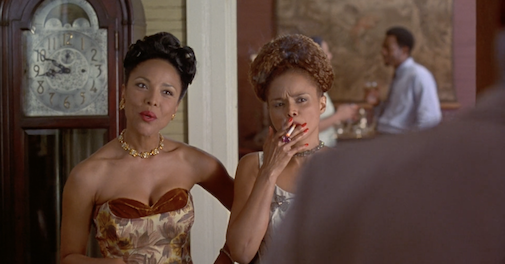
You’d be forgiven for not immediately lingering on Mozelle Batiste Delacroix. When we first meet her she’s one of several dozen luminous, handsomely dressed and manicured faces floating around a party at the home of the Batiste family in 1960’s Louisiana. Mozelle’s very first scene, giggling with her sister about some poor woman’s teeth before they’re interrupted, is largely dominated by other actors, and she doesn't mind sitting back and enjoying her niece and nephew’s shenanigans.
There’s also a lot of stuff happening around her. Not just the laying-out of key figures and relationships but the very nature of Eve’s Bayou as a memory play...
It's a child’s diary organizing a chorus of conflicting testimonies from her entire family, a film that's equally crouched in Past and Present with different orators trying to make sense of everyone’s behavior while holding tight to their own secrets. Hell, maybe we’re still thinking about what the title means after we learn the Batiste’s lineage. Eve’s Bayou is named for Eve, a slave who was given the whole bayou and her freedom as compensation for saving the life of a French aristocrat with whom she had multiple children. The Batiste’s youngest daughter Eve (Jurnee Smollett) is named after this woman, and an adult version of Eve (Tamara Tunie) narrates this history. So who is Eve’s Bayou about, and who or what is it named for?
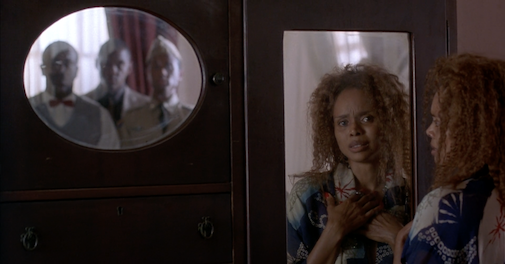
Writer/director Kasi Lemmons presents all of this frankly, asking us to take these complicated personalities and mystic connections in our stride and really think about what we’re seeing in each scene, and how each choice reverberates backwards and forwards through each character in the film. Debbi Morgan plays Mozelle Batiste with a directness and economy befitting Lemmons’s approach. Mozelle, a Hoodoo practitioner who is able to read people’s futures, is the character most entrenched in the supernatural and the Gothic. Her work places her at the crossroads of past and present deeper than anyone else in the Batiste family (give or take Eve herself), yet Morgan, using her voice to richly emotive effect while foregrounding stillness, opacity, and watchfulness in her face and body, rises to every one of these challenges to create the fullest character in the whole film.
The next time we meet Mozelle after the party she has suffered an unendurable tragedy. Her husband Harry died in a car accident on their way home that night, and she is once again a widow. Harry is, in fact, the third husband to die, and when her niece Eve (Jurnee Smollet) helps get ready in the morning before work, Mozelle hears one of them call out her name and her eyes widen to see them side-by-side in her mirror. “I loved them,” she says, holding her hands over her heart, “I swear I did.”
Eve’s Bayou stays with Mozelle as she consorts with her niece and tends to her business. There’s a strong family resemblance between Mozelle and Eve, in their auburn hair and the tone of their skin, as well as in their intense loyalties to their families, their bullish attitudes, their quick wits. It’s never explicitly stated that Mozelle knows of her niece’s budding powers, yet their camaraderie - a relationship Mozelle seemingly doesn’t have with either of Eve’s siblings - rings as much of an elder guiding a newer generation, giving her the tools to understand something she presumably had to learn alone. This further contextualizes Morgan’s beguiling mixture of directness and unknowability as that of an adult finding ways to express herself candidly to her young relative who’s a few years away from getting the whole story. Imagine what she’ll get to share with Eve in a few years.
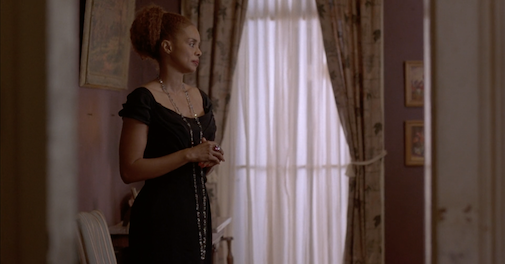
What’s really stuck with me about Morgan’s work over repeat viewings is the sheer degree of difficulty. Beyond adhering to the singular tonal demands posed by Eve’s Bayou as a film, there’s plenty to Mozelle as written that could read as ridiculous without a controlled actress at the helm. The Hoodoo powers, the Blanche Deveraux stories for her dead husbands, the rivalry with Diahnn Carroll’s swamp witch, the smoldering hunk of man played by Vondie Curtis-Hall who wanders on her doorstep in the rain asking for her help, the nascent fatalism - it’s a lot! Any of these elements might wither away without a skilled performer working in tandem with her director.
Morgan interacts with such concision and purpose towards that none of this seems out of the ordinary. She achieves a Gothic, slightly haunted air without cleaving to false melodramatics. She nails equally difficult but more peripheral tasks that might not seem like challenges, like the way her sisterhood with Lynn Whitfield’s Roz is so convincing I initially forgot Mozelle was related to Roz’s husband Louis, not her. Her in-the-moment reactions are incredibly sharp, and she picks the right moments to be unabashedly expressive, like when she discovers a tragedy she feared would hit her family has befallen someone else, and she has to find some way to look upset and inwardly elated. Her decisions clearly come from bone-deep instincts and lived experience even when she’s caught entirely by surprise, and Morgan lets the strength of those instincts speak for themselves.
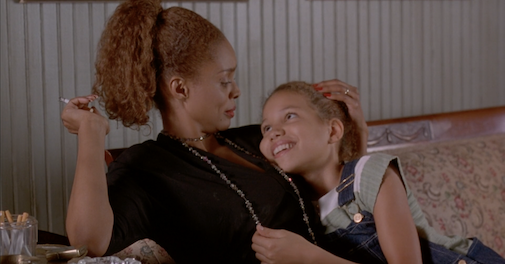
If you want an example of a seemingly unplayable scene that Morgan executes beyond perfectly, take my absolute favorite scene of Eve’s Bayou, where Mozelle recounts to Eve exactly when she learned that her second husband Maynard loved her the most out of the three men she’d married. I am loath to go too deeply into what happens during this scene, because it arrives so unexpectedly when it does, and because the simplicity of its staging and the might of its feelings are so affecting. Morgan walks through this memory as both spectator and participant, and the kaleidoscopic range of passion, steel, love, helplessness, and panicked despair in her voice and expression - all while she holds the poise of a glass-blown sculpture until the very last second - is just devastating. The whole film deepens thematically and emotionally for this scene, and Morgan’s performance is essential to achieving this.
Morgan also modulates her directness and opacity to further enrich Mozelle’s mysteries and odd edges rather than denuding them. In many of her reveries Mozelle seems lost in her own world, looking off into the distance with the charismatic intensity of a Golden Age Hollywood star. You believe Mozelle when she says she almost forgot Eve was standing next to her, not because she’s ignoring her niece but because she’s so immersed in the weight of her own memories. How much has this woman lived through?
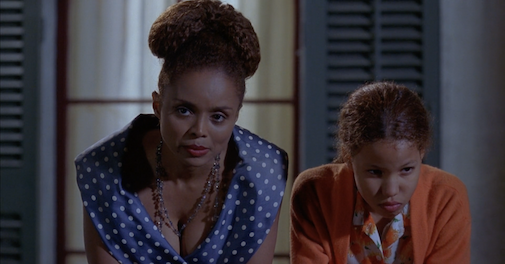
And it’s important to emphasize that Mozelle is actually communicating with Eve. Even in her last scene with Eve, where Mozelle comforts her niece not to look back at the past and ensures her that she’ll see her father again someday, there’s a very physical disconnect present in Morgan’s face and body - she’s looking away from Eve while she talks about her dream, and even though they’re lounging on different parts of the same tree, they’re standing far enough from each other that they’re rarely in the same shot. Yet it’s clear in her voice that Mozelle is talking to Eve the whole time, sharing something with her that she believes will help her grow from what they’ve all experienced that fateful summer.
Honestly, I don’t know what else is left to say about this performance. Eve’s Bayou was a film I watched relatively early in my cinephilia, and it’s a fascinatingly tough film to use as a guiding post for how films should be. Understanding how movies behave writ large has never prepared me for how Eve’s Bayou looks, moves, and acts, and Morgan’s resplendent turn is as evocative to me now as it was all those years ago. Test yourself against this film, and get swept away by the majesty of what it’s giving you. Morgan gives one of the very best performances from this year, and you’re only neglecting yourself by not seeing it.
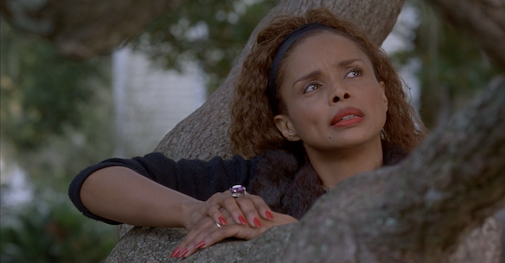
Eve’s Bayou is currently streaming on Paramount+ and Amazon Prime. It’s also recently been announced as part of Criterion’s October lineup - go look at how gorgeous the cover is!
 1997,
1997,  Debbi Morgan,
Debbi Morgan,  Eve's Bayou,
Eve's Bayou,  Kasi Lemmons
Kasi Lemmons 


Reader Comments (5)
Ooh, I remember the Eve's Bayou buzz so well, but I remember how it felt too "different" (however anyone wants to interpret that) for that year's lineup, which really leaned heavily into more mainstream taste. Lemmons and Morgan both received so much well-deserved praise for this, but, true to form, Lemmons's work didn't received more widespread attention until she started going the biopic route in recent years, continuing this year with I Wanna Dance with Somebody, reuniting her with Tamara Tunie but sadly not Morgan, who never had a film role this good before or since. Morgan will always be "Angie" from AMC to many forever, but I'm so glad she got this one moment in time (heh) to shine somewhere else as well.
I first saw this in about 1999,it used to take ages for small films to arrive at the local video store and even then pickings could be slim but they got hold of this gem.
I have watched it three times now and always enjoy it's southern gothic wierdness and that most of the roles are slightly off except Jurnee,Morgan is the standout but all roles are filled very well.
I would have had Morgan in my Top 5 but let's be honest despite reviews she stood zero chance.
I am unsure about the Whitney biopic,I hope it tells us more than what countless docs and TV shows have served us.
Truly one of the finest films of the 1990s and I'm glad it's getting a big Blu-Ray release from Criterion.
A beautiful write-up on a beautiful performance. Indeed, Morgan's my choice for Best Supporting Actress of 1997, with Julianne Moore as runner-up.
I have never seen this and now it movies right up to the top of my queue. As a rabid All My Children fan, Debbi Morgan's brilliance has been obvious to me since I was a teenager. Her Emmy-winning performance as Dr. Angela Hubbard has given soap fans some of the most tearjerking scenes of all time, including her husband Jesse's death (he would return!). Morgan, even when she was young, conveyed a gravitas in the most outrageous of storylines that could save some nebulous writing. Ms. Morgan, thank you.